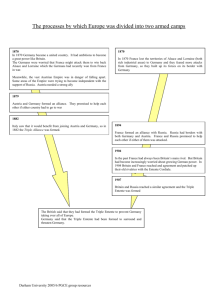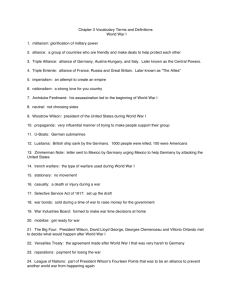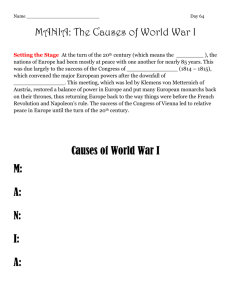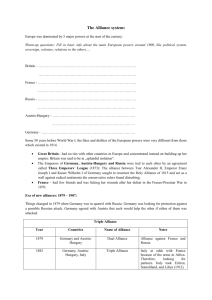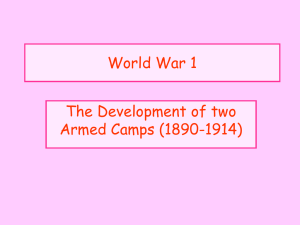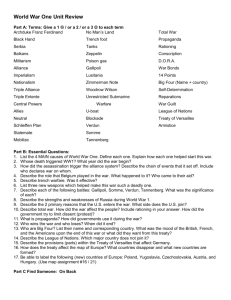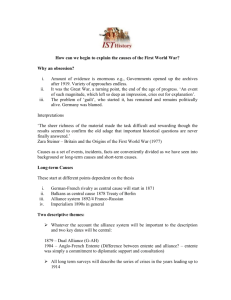The Causes of the Great War – “Alliances”
advertisement
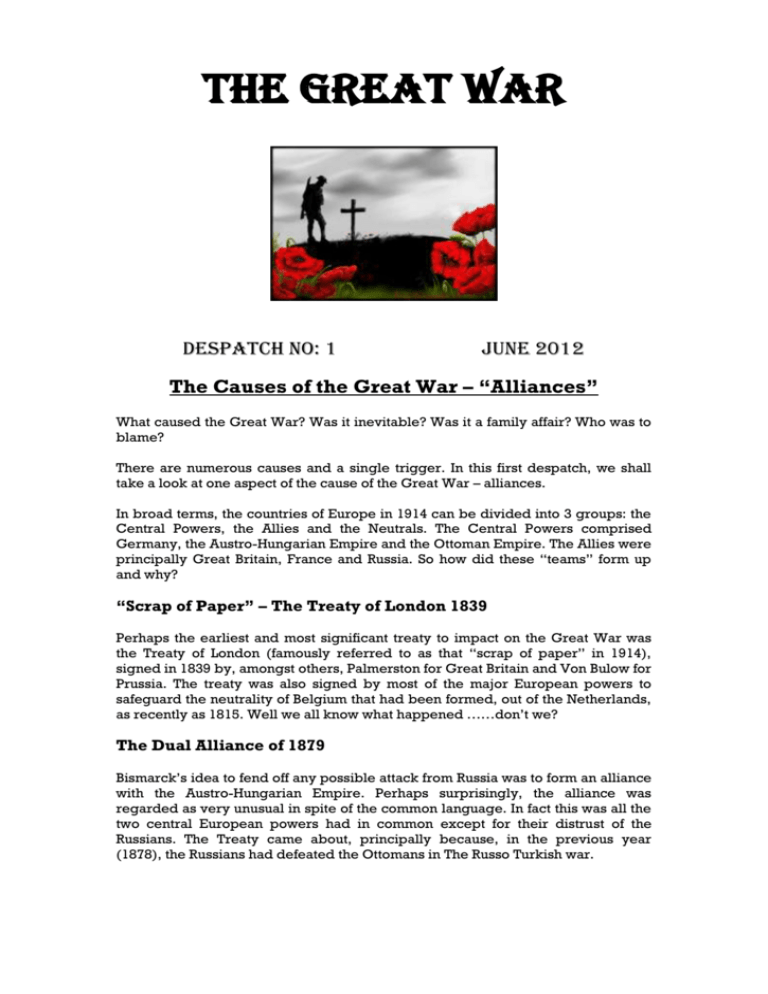
THE GREAT WAR Despatch no: 1 June 2012 The Causes of the Great War – “Alliances” What caused the Great War? Was it inevitable? Was it a family affair? Who was to blame? There are numerous causes and a single trigger. In this first despatch, we shall take a look at one aspect of the cause of the Great War – alliances. In broad terms, the countries of Europe in 1914 can be divided into 3 groups: the Central Powers, the Allies and the Neutrals. The Central Powers comprised Germany, the Austro-Hungarian Empire and the Ottoman Empire. The Allies were principally Great Britain, France and Russia. So how did these “teams” form up and why? “Scrap of Paper” – The Treaty of London 1839 Perhaps the earliest and most significant treaty to impact on the Great War was the Treaty of London (famously referred to as that “scrap of paper” in 1914), signed in 1839 by, amongst others, Palmerston for Great Britain and Von Bulow for Prussia. The treaty was also signed by most of the major European powers to safeguard the neutrality of Belgium that had been formed, out of the Netherlands, as recently as 1815. Well we all know what happened ……don’t we? The Dual Alliance of 1879 Bismarck’s idea to fend off any possible attack from Russia was to form an alliance with the Austro-Hungarian Empire. Perhaps surprisingly, the alliance was regarded as very unusual in spite of the common language. In fact this was all the two central European powers had in common except for their distrust of the Russians. The Treaty came about, principally because, in the previous year (1878), the Russians had defeated the Ottomans in The Russo Turkish war. This itself had led to the treaty of San Stefano and the re-creation of Bulgaria as a sovereign state after 500 years of Ottoman rule. This gave Russia considerable influence in the Balkans and gave the Habsburgs considerable cause for concern. Austro-Hungary & Serbia Alliance of 1881 An alliance between the 2 powers/countries designed to limit Russian ambitions in the Balkans. The Triple Alliance (1882) The Triple Alliance was the military alliance between Germany, Austro-Hungary, and Italy. Each member promised mutual support in the event of an attack by any other great powers or for Germany and Italy, an attack by France alone. In a supplementary declaration, Italy specified that its undertakings could not be regarded as being directed against Great Britain Shortly after renewing the Alliance in June 1902, Italy secretly extended a similar guarantee to France. When Austro-Hungary found themselves at war in August 1914 with the rival Triple Entente (Britain, France, and the latter's ally, Russia), Italy pledged to support the Central Powers. However, because Germany and Austria–Hungary had taken the offensive while the Triple Alliance was supposed to have been a defensive alliance, Italy did not enter into the war. Later on, Italy entered the conflict on the side of the Entente against Austria–Hungary in May 1915 and Germany in August 1916. The Franco Russian Alliance (1894) A political and military pact that developed between France and Russia from friendly contacts in 1891 to a secret treaty in 1894; it became one of the basic European alignments of the pre-World War I era. Germany, assuming that ideological differences and lack of common interest would keep republican France and tsarist Russia apart, allowed its Reinsurance Treaty with Russia to lapse in 1890. In the event of war, France wanted support against Germany; and Russia, against Austria-Hungary. The two powers slowly came closer together, upsetting the system of alliances that had been established by Bismarck to protect Germany against such a potential “two-front” threat. In August 1891 they made a preliminary agreement to consult in case of aggression against either of them. This agreement was strengthened by a military convention in August 1892. The Entente Cordiale of 1904 The Entente Cordiale, an agreement between Britain and France, resolved a number of longstanding colonial disputes, and established a diplomatic understanding between the two countries, which however stopped short of binding either to any military undertaking in support of the other. France, keen to build a buffer against possible German aggression, signed the agreement in a bid to encourage an Anglo alliance with France. Similarly Britain was willing to encourage co-operation between the two countries with an eye on Germany's decision to expand her naval strength in competition with Britain. The entente was extended in 1907 to include Russia, culminating in the alliance that formally took on the Central Powers during World War One. This became known as the Triple Entente.

